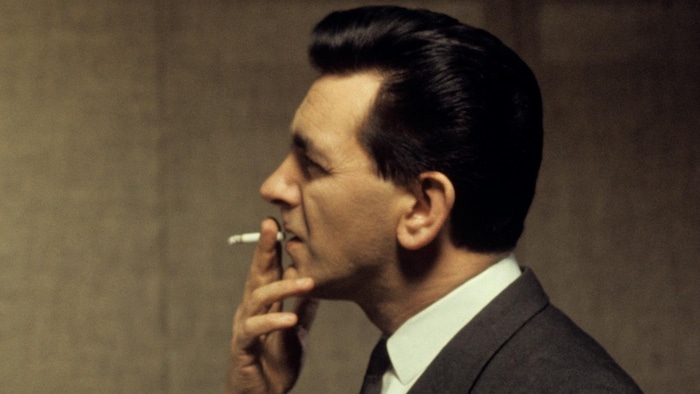Open in full screen mode Dr Camille Laurin, one of the most important political figures of Quebec of the last 50 years, died on March 11, 1999. Radio-Canada Please note that this article published in 2019 may contain information that is no longer current. The March 11, 1999, Camille Laurin disappeared. Our archives highlight the extent to which this man played an important role as a politician and psychiatrist in Quebec. Camille Laurin was born in Charlemagne on May 6, 1922. The deputy for the Assomption constituency, Paul Gouin, noticed his precocious intelligence. The latter sponsored the classical studies that the young man's father could not have paid for. Loading ELSE ON INFO: Specter of war: hospitals in Lebanon would not “last two days” Loading in progress ELSELL ON INFO: Specter of war: hospitals in Lebanon would not “last two days” In 1943, Camille Laurin enrolled at the University of Montreal, where he studied medicine. He obtained astonishing grades there. He specialized in psychiatry in Boston and Paris in the 1950s. At the age of 35, in 1958, he was appointed director of what would become, a few years later, the Department of Psychiatry at the University of Montreal. He is also secretary of the Association of Psychiatrists of Quebec. Dr Camille Laurin brought back from his studies abroad a modern conception of psychiatry and mental illness that he wants to implement in Quebec. Foreground, October 11, 1959 October 11, 1959 , host Wilfrid Lemoine of the show Premier planinterviews him. Lauren. The remarks focus on the reasons for mental illness as well as society's prejudices towards those who suffer from it. The interview is cut in two by images without sound. In 1961, Jean-Charles Pagé, a former patient at Saint-Jean-de-Dieu Hospital , publishes a book, The madmen cry for help!,which denounces the delay in psychiatric care in Quebec. The preface of the book is signed by Dr. Laurin. The book shocks and mobilizes Quebec society. In September 1961, the government of Jean Lesage reacted by creating the Bédard commission. Through its recommendations, this commission modernized the practice of psychiatry in Quebec from 1962 . Camille Laurin saw medicine and psychiatry as powerful instruments of social transformation. It is this conception that leads him to engage in active politics and to support the Quebec independence project. In 1968, he was, with René Lévesque, one of the founding fathers of the Parti Québécois. To his great surprise, he was elected president of the executive, which made him number two. Conference of press, December 27, 1968 On December 27, 1968, Camille Laurin was interviewed after his press conference on the meaning of the acronym adopted by the PQ. In this brief interview, we hear the themes that concern Dr. Laurin and which explain his commitment to the Parti Québécois. In 1970, Camille Laurin became one of the seven deputies elected from the Parti Québécois to the National Assembly of Quebec. On November 15, 1976, the Parti Québécois took the power. Prime Minister-elect René Lévesque appoints Camille Laurin Minister of State for Cultural Development. The new minister is responsible for creating a new linguistic law that will replace the highly contested law 22 of the previous government of Robert Bourassa. Dr Laurin sees this reform as a salutary and necessary electric shock to restore pride to French-speaking Quebecers and shake them out of their political lethargy. On April 1, 1977, he submitted his bill to the National Assembly, which would become known as the Charter of the French Language or Law 101. Special broadcast, Submission of the draft Charter of the French language, April 1, 1977 Radio-Canada television is presenting a special program on this occasion which relays the minister's press conference. His speech expresses in very clear words the objectives which motivate his legislative intervention. The Charter of the French Language establishes French as the only official language of the State of Quebec. Dr. Camille Laurin is proposing a radical break with the history of the province since 1763. We understand in this context that the bill will be fought tooth and nail by certain sectors of society. Within the English-speaking community, in particular, Camille Laurin is hated. Some of his opponents associate him with the villainous Dr. Julius No, one of the two main protagonists of the filmJames Bond 007 against Dr No. Others go even further by comparing him to Dr. Joseph Goebbels, the propaganda master of Nazi Germany. The Language Charter French language was adopted on August 26, 1977. Precisely 10 years later, the Movement for a French Quebec celebrated its anniversary.
Specter of war: hospitals in Lebanon “wouldn't last two days”
Specter of war: hospitals in Lebanon would not “last two days”
Journalist Claude Gervais was present at this event and recorded certain reflections of Dr. Laurin in the report broadcast on Téléjournal of August 26, 1987.
It was a worried and critical message that Camille Laurin then offered.
According to him, Bill 101 gave a false sense of security to Francophones and worked against the sovereignist option during the 1980 referendum.
The situation that he described must have been sadly ironic for the politician and the psychiatrist.
Former Quebec Prime Minister Lucien Bouchard described Dr. Laurin as the one who contributed the most to affirming the identity of Quebec.
Through his medical and political action, the one his colleagues affectionately called “the doctor” has played an undeniable role in the social and political evolution of Quebec over the last 50 years.
Start of widget. Skip widget?End of widget. Return to start of widget?

